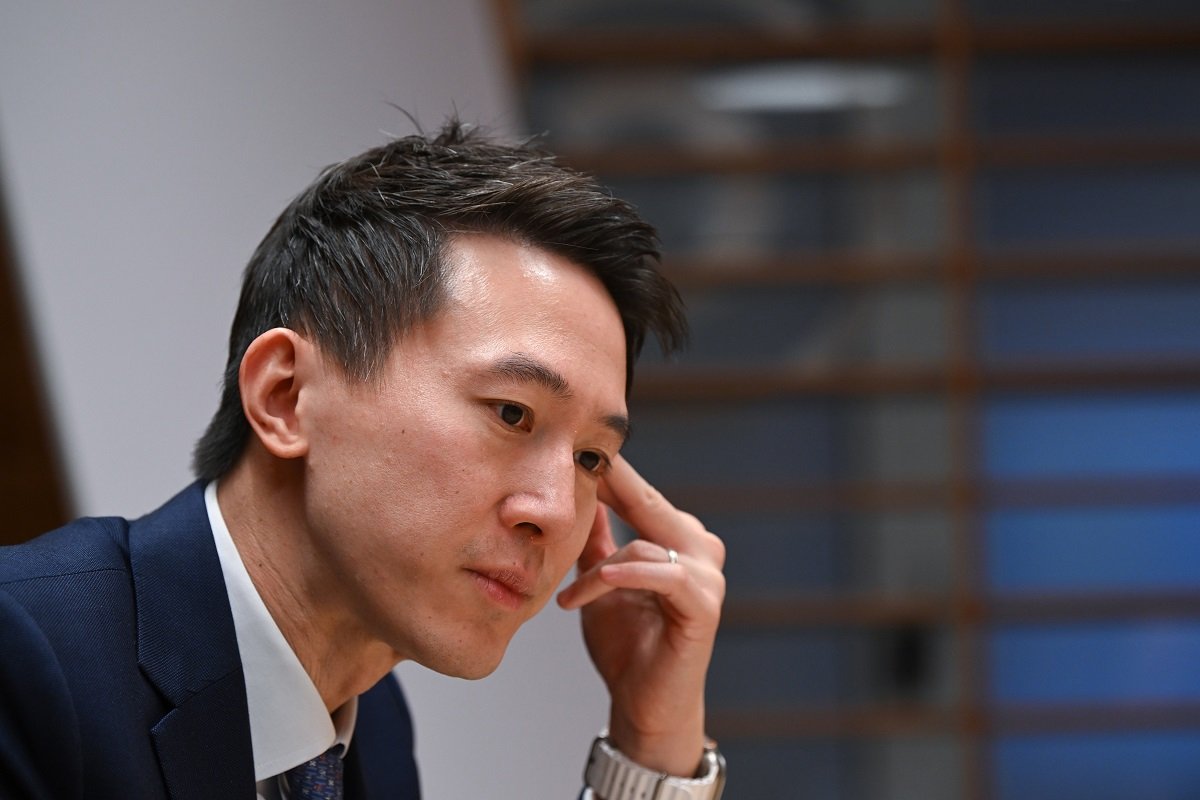
TikTok CEO Shou Zi Chew is interviewed on Feb. 14, 2023, at the company’s offices in Washington, D.C.
13:48 JST, March 17, 2023
Three years after the Trump administration failed to force the sale of TikTok to an American buyer, the Biden administration is trying again, charging forward into the same legal and constitutional minefield with just as little evidence that the short-video app poses an actual threat.
The Biden administration’s push to force TikTok’s Chinese owner ByteDance to sell off one of the world’s most popular apps has gained more bipartisan support than a similar Trump attempt in 2020, and the app has in recent years emerged as a major lightning rod for lawmakers unnerved by China’s technological prowess and social media’s impact on children and teens.
But it will probably face all the same challenges that doomed President Donald Trump’s bid in 2020, during which federal judges ruled the government had not provided proof that the app, which has more than 100 million U.S. users, presented enough of a national security risk to outweigh Americans’ First Amendment rights to free expression.
ByteDance, a Beijing-based tech company that says its shares are mostly owned by big international investors, could also be blocked from selling TikTok by the Chinese government, which added key pieces of its technology, including its recommendation algorithms, to an export-ban list during the Trump showdown – in an apparent attempt to fend off a sale in the future.
Adam Segal, a national security and Chinese policy expert at the Council on Foreign Relations, said he questioned how the U.S. government’s strategy would differ from Trump’s attempt, which fueled a geopolitical standoff and Chinese claims that the United States was attempting a “smash and grab.”
“I still don’t know what they think the outcome is going to be,” Segal said. “Many of the legal issues that TikTok used to block the forced sale under the Trump administration would still be relevant. And there’s still the high possibility that the Chinese wouldn’t allow a sale.”
A forced-sale attempt would also be fraught because of TikTok’s likely high commercial value, which could make it challenging to find a buyer who could afford the Chinese owners’ costly stakes in the company, said Jim Lewis, director of the strategic technologies program at the Center for Strategic and International Studies.
The company has no public valuation, but some analysts expect it could surpass YouTube with more than $25 billion in ad revenue by 2025. ByteDance, which is estimated to be worth more than $200 billion, will probably not let it go without a costly legal fight.
The prolonged government investigation into TikTok, which began under the Trump administration in 2019, has left TikTok politically “radioactive,” Lewis said, and TikTok could face an uphill battle in striking a deal that would appease Washington and Beijing among heightened tensions.
The situation has “an angry Chinese government, a deeply suspicious U.S. government and not a lot of options to get out of this mess,” Lewis said.
The app’s status as a Washington boogeyman has catapulted it to the center of a political storm, which CEO Shou Zi Chew is expected to confront in a congressional hearing next week.
The government has argued that its owner’s roots in China could lead to the app being used for mass propaganda or espionage. But TikTok and ByteDance have repeatedly disputed the claims, and federal officials have yet to provide any evidence that the Chinese government has accessed Americans’ data or meddled with TikTok’s code.
White House press secretary Karine Jean-Pierre told reporters Thursday that the Biden administration is “concerned” about China’s use of online platforms in ways that could threaten national security or Americans’ safety, but stressed that the Committee on Foreign Investment in the United States (CFIUS), which approached the app pushing an option to divest, operates independently of the White House.
“There’s a process here, and we try to stay away from that process,” Jean-Pierre said. “CFIUS has a process that they’re going through. We’re going to let them go through their process.”
The White House last week threw its support behind a bipartisan proposal, led by Sen. Mark R. Warner (D-Va.), that would allow the Commerce Department to review the potential risks of apps with links to certain foreign “adversary” countries, such as China, and order more official restrictions or a nationwide ban.
TikTok spokeswoman Brooke Oberwetter said divestment would not impose any new restrictions on data access, and that the “best way” to address national security concerns would be a plan that would bring greater transparency and third-party monitoring to its handling of U.S. users’ data.
CFIUS, a group of federal agencies in the Treasury Department that reviews business deals, has been negotiating with TikTok since 2019 on ways to address the government’s national security concerns.
ByteDance last year proposed a $1.5 billion restructuring plan, known as Project Texas, that would have subjected the company to close government scrutiny and third-party monitoring while allowing ByteDance to retain an ownership role. CFIUS officials, however, recently told the company that the mitigation agreement was not enough and that they wanted ByteDance to fully divest itself from TikTok’s U.S. operation, company officials said.
Five White House offices, including the National Security Council, can also participate in CFIUS discussions. The National Security Council and the Treasury declined to comment, and CFIUS has not responded to requests for comment.
The Biden administration’s stance could face resistance from free-market advocates, who argued during the Trump bid that a heavy-handed approach could conflict with America’s traditional attitudes to corporate competition. But the sale order could come as a gift to TikTok’s American competitors, including Snapchat owner Snap, and Facebook and Instagram’s parent company Meta, which has sought to portray TikTok as a unique threat to American children through a media and lobbying campaign. Both companies’ stock prices climbed Thursday.
Absent a deal or an agreement from ByteDance to divest, Lewis expects TikTok will be in the middle of “mud wrestling” between the two governments. A spokesperson for the Chinese Ministry of Foreign Affairs said Thursday at a news conference that “the U.S. has yet to prove with evidence that TikTok threatens its national security” and “should stop spreading disinformation about data security, stop suppressing relevant companies, and provide an open, fair, just and nondiscriminatory environment for foreign businesses to invest and operate in the U.S.”
The Biden administration has more tools at its disposal to escalate pressure on TikTok. It remains unclear whether federal officials would push to bar American companies from working with ByteDance or TikTok, an aggressive measure that could starve the company of vital technological resources, including U.S. servers or software. The government adopted a similar approach against the Chinese telecommunications giant Huawei, cutting off its phones from being able to use basics, such as Google’s Android operating system, and almost entirely eradicating Huawei’s phone business in the United States.
TikTok has presented a political quandary for the Biden administration as it seeks to navigate an increasingly tense relationship with China. The Biden administration officially revoked Trump’s executive order banning TikTok in 2021, saying it would instead launch a security review of many foreign-linked apps alongside a parallel push for a comprehensive national privacy law.
Federal officials’ claims of national security concerns have led to the app being banned on government-owned devices across more than two dozen states and cities, including the public WiFi networks on college campuses. But the push for a broader privacy law has gone nowhere, even though the tech industry is largely unregulated and raises many of the same data-privacy and algorithmic-transparency concerns as TikTok.
Warner, head of the Senate Intelligence Committee, praised CFIUS on Thursday for moving toward divestiture but said he remains unconvinced the action would be enough.
“The devil is in the details, and I look forward to seeing them,” he said in a statement to The Washington Post. “This news also reinforces the need for my bipartisan legislation to establish a comprehensive, rules-based approach to tackle foreign-based tech threats, with a full suite of tools that includes a potential ban.”
Warner told The Post last year that he questioned whether any mitigation effort would be enough to resolve TikTok’s potential risks, calling it “one of the very few areas where Donald Trump may have been right.”
TikTok has argued that a forced sale will not solve the bigger industry issues of data privacy or algorithmic oversight that its Project Texas plan was designed to address. But even some inside the company questioned whether the proposed restructuring – which would have still left ByteDance ownership intact, although through a subsidiary whose leaders were chosen by CFIUS – would have been enough.
ByteDance managers in China still oversee the teams handling the TikTok U.S. app’s design and engineering, and U.S. workers still must rely on and communicate through ByteDance internal workplace tools, such as Lark, that would not have changed under the Project Texas plan.
The Biden plan echoes a similar move by CFIUS in 2019 to force a Chinese company, Beijing Kunlun Tech, to sell the gay dating app Grindr because of concerns that Americans’ personal data could be used for spying or blackmail. But even after Grindr’s sale to an American company, the app’s data was used for such purposes by a conservative Catholic group that bought it to identify and track gay priests, a Washington Post investigation found this month. No U.S. laws ban the sale of such data.
“If your top concern was the misuse of American citizens’ data, your top concern would be national data laws, not just banning TikTok,” Segal said. Of TikTok, he added, “there’s a sense they can’t win in the current domestic environment, no matter what happens.”
Top Articles in News Services
-

Survey Shows False Election Info Perceived as True
-

Hong Kong Ex-Publisher Jimmy Lai’s Sentence Raises International Outcry as China Defends It
-

Japan’s Nikkei Stock Average Touches 58,000 as Yen, Jgbs Rally on Election Fallout (UPDATE 1)
-

Japan’s Nikkei Stock Average Falls as US-Iran Tensions Unsettle Investors (UPDATE 1)
-

Trump Names Former Federal Reserve Governor Warsh as the Next Fed Chair, Replacing Powell
JN ACCESS RANKING
-

Producer Behind Pop Group XG Arrested for Cocaine Possession
-

Japan PM Takaichi’s Cabinet Resigns en Masse
-

Japan Institute to Use Domestic Commercial Optical Lattice Clock to Set Japan Standard Time
-

Man Infected with Measles Reportedly Dined at Restaurant in Tokyo Station
-

Israeli Ambassador to Japan Speaks about Japan’s Role in the Reconstruction of Gaza
























